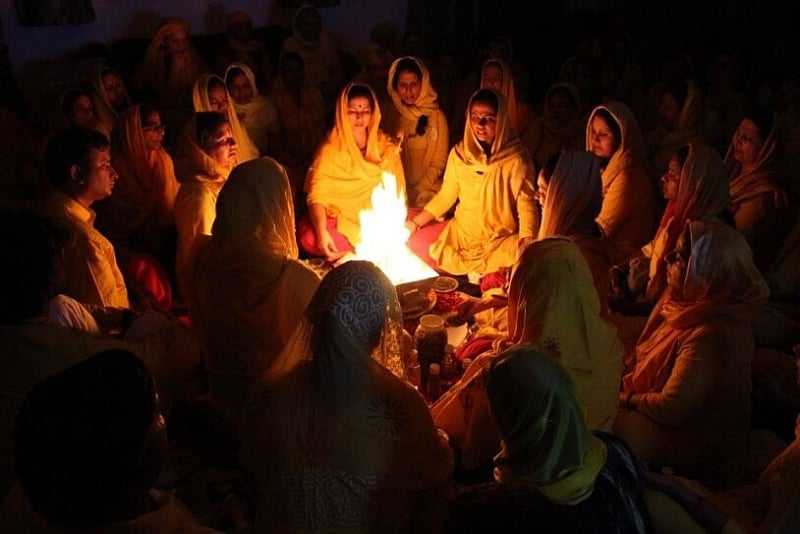The concept of reincarnation is central to Hindu/Vedic philosophy, positing that the soul, embodied within a physical form composed of the five elements, undergoes repeated births and deaths based on the karmic residue accumulated during each lifetime. This cycle continues until the soul achieves liberation, or moksha, freeing itself from the karmic wheel. However, not all souls reincarnate immediately. Some may have completed their earthly karmic cycle, while others, burdened by unresolved karmas, remain suspended in different dimensions of existence, unable to manifest in a human form. These souls may exist as ghosts or spirits, or reside in the pitr lok, the realm of the ancestors. Regardless of their state, these souls, bound by the cycle of birth and death, often require energetic support from their descendants to balance their karmic debts and facilitate their eventual rebirth.
Shradh rituals, deeply embedded within Hindu/Vedic culture, serve as a vital link between the living and their departed ancestors. These rituals are performed during specific astrological periods when the veil between dimensions is believed to thin, enabling the ancestors to connect with their living relatives. Shradhs involve offerings, prayers, and the chanting of specific mantras, all intended to provide spiritual sustenance and assist the ancestors in their journey towards liberation. Through these acts of remembrance and reverence, descendants contribute to the karmic balance of their forebears, facilitating their release from undesirable states of existence and paving the way for their future reincarnation. Furthermore, acts of charity and ritual offerings performed in the name of the deceased are considered essential, as the human form is perceived as the optimal vehicle for accumulating positive karma. Once detached from the physical realm, the soul is reliant on the actions of its descendants for spiritual progress.
Unfortunately, the profound knowledge and efficacy of Vedic sciences and rituals, including the significance of Shradhs, are often overlooked by younger generations. The modern education system, largely inherited from the colonial era, often neglects the rich heritage of Vedic knowledge, focusing instead on a curriculum that sometimes downplays the significance of ancient Indian traditions. This disconnect contributes to a growing skepticism towards these practices, with some dismissing them as mere superstition or fictional narratives. However, a deeper examination of historical evidence suggests a more complex reality.
Ancient civilizations, including the Egyptians, Mesopotamians, Romans, Mayans, and the Vedic civilization, all shared a belief in the afterlife and the transmigration of souls. Structures like the pyramids, found across continents, stand as testaments to the advanced scientific understanding of these ancient cultures, demonstrating profound knowledge of mathematics, astronomy, and engineering. The alignment of pyramids with celestial bodies like Orion’s Belt, and the discovery of high levels of radioactivity at archaeological sites like Mohenjo-daro, hint at a sophisticated understanding of the cosmos and possibly even advanced technologies that remain enigmatic to modern science.
Examining ancient texts like the Ramayana, which describes advanced weaponry and technologies, further strengthens the argument for a highly developed understanding of energy and the cosmos within these ancient cultures. The Hindu/Vedic tradition, being one of the oldest surviving cultures, provides a unique lens through which to interpret these ancient mysteries. Its continued practice, spanning millennia, speaks to the enduring power and relevance of its principles. The intricate rituals and mantras are not simply archaic practices, but rather represent a sophisticated system of knowledge passed down through generations, offering insights into the nature of reality and the human journey.
For those experiencing unexplained phenomena or persistent difficulties attributed to ancestral imbalances (pitr dosh), the Vedic tradition offers a range of remedies. Shradh rituals, coupled with other practices like yagyas (fire ceremonies) and gaubhoj (feeding cows), are believed to appease ancestral spirits and mitigate negative karmic influences. These practices, rooted in a deep understanding of energy and consciousness, aim to restore harmony and balance between the living and the departed, paving the path for individual well-being and spiritual evolution. Organizations like the Dhyan Foundation actively promote these practices, offering guidance and resources to those seeking to understand and benefit from the wisdom of the Vedic tradition. These resources can be particularly helpful for those who feel a presence of ancestral energies or are experiencing difficulties attributed to pitr dosh. By engaging in these prescribed techniques, individuals can actively participate in their spiritual journey, fostering a deeper connection with their lineage and working towards a more harmonious existence.


